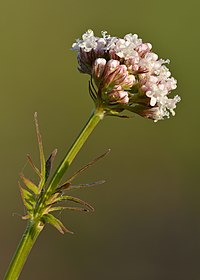
Photo from wikipedia
Abstract Background Antidiabetic activity of aqueous root extract of Strophanthus hispidus (SHP) was evaluated based on its folklore used in traditional medicine for the treatment of diabetes. Objectives: This study… Click to show full abstract
Abstract Background Antidiabetic activity of aqueous root extract of Strophanthus hispidus (SHP) was evaluated based on its folklore used in traditional medicine for the treatment of diabetes. Objectives: This study aimed to investigate the in-vitro and in-vivo antidiabetic potential of the aqueous root extract of SHP. Methods SHP (50, 100 and 200 mg/kg p.o.), glibenclamide (5 mg/kg p.o.), normal saline (10 mL/kg; diabetic control) and distilled water (10 mL/kg; normal control) were administered once daily for 28 days, with the measurement of fasting blood glucose level at 7 days interval. Blood samples were collected on day 28 for serum biochemical (albumin, total protein [TP], creatinine, alanine transaminase [ALT], aspartate transaminase [AST], alkaline phosphatase [ALP], triglycerides [TG], total cholesterol [TC], high-density lipoprotein [HDL], low-density lipoprotein [LDL], bilirubin and urea) and hematological assays. The in-vitro antidiabetic activity was investigated using α-amylase and α-glucosidase enzymes inhibitory assays. Results SHP produced a day-dependent reduction in glucose level. Peak reduction (82.94 %; p < 0.05) was produced at the dose of 100 mg/kg. SHP significantly (p < 0.05) increased the level of HDL and TP but significantly (p < 0.05) reduced the levels of TG, LDL, TC, AST, ALT, ALP, bilirubin, creatinine and urea compared with diabetic control rats. Furthermore, SHP significantly (p < 0.05) increased the level of catalase, superoxide dismutase and reduced glutathione compared to diabetic control rats. SHP significantly (p < 0.05) inhibited α-amylase and α-glucosidase enzymes compared with acarbose. Conclusion The findings in this study showed that SHP possesses beneficial antidiabetic activity.
Journal Title: Journal of Complementary and Integrative Medicine
Year Published: 2019
Link to full text (if available)
Share on Social Media: Sign Up to like & get
recommendations!